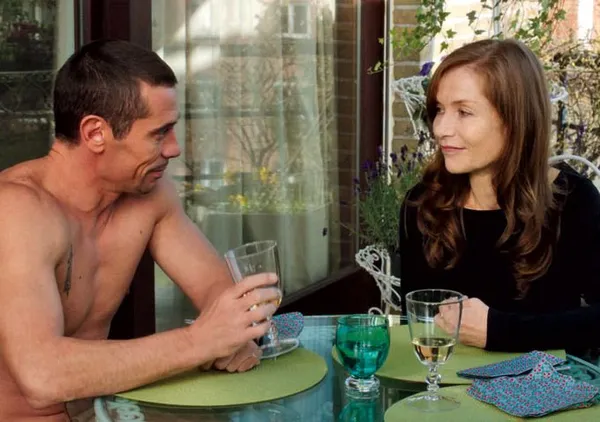 |
| Kool Shen as Vilko and Isabelle Huppert as Maud: 'He is a swindler but not violent.' |
Maud (Isabelle Huppert) sees a man being interviewed in a talk show on TV and can't take her eyes off him. She wants to cast this man, Vilko Piran (Kool Shen), in her next film. With Abuse Of Weakness, Breillat follows up brilliantly on the fairy tale promises of her previous two films after her stroke, The Sleeping Beauty (La Belle Endormie, 2010) and Bluebeard (Barbe Bleue, 2009). A sleeping beauty, Maud is about to meet her Bluebeard.
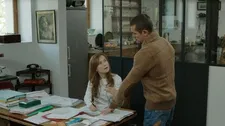 |
| Vilko (Kool Shen) and Maud (Isabelle Huppert) - 'He wants the money very quickly.' |
Catherine Breillat: Of course. I had finished The Last Mistress (2007) and I didn't know what to do next. I didn't want to wait. It was a television project. They were so surprised because I wrote the script, made the casting, made the costumes, found the location. After three weeks, I was ready to shoot. One week before the start I had a stroke attack. Many other filmmakers then wanted to do Bluebeard.
AKT: But they waited for you. Bluebeard is yours. Is that the casting for Bluebeard that you show in Abuse Of Weakness?
CB: That's for The Sleeping Beauty. All the little girls. Rocancourt was with me all the time. At three o'clock, all the mothers with their children would come [for the casting]. And I told him to leave.
AKT: It's a strong scene in your film. Maud throws him out. It tells a lot about the relationship. The gestures say it all. Not only does Vilko [the Rocancourt character played by Kool Shen] get her to write cheques for him, he holds the cheque book for her and he tears them out of the booklet. The most violent writing of cheques I have seen.
CB: Yes, he wants the money very quickly.
AKT: Early on in the film, at the hospital, after Maud had the stroke, there is a scene in which Isabelle Huppert's character tells the speech therapist that she "would like to laugh." Can you talk about film and reality here?
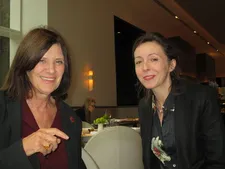 |
| Catherine Breillat with Anne-Katrin Titze at Jean-Georges Vongerichten's Nougatine on Central Park West - 'It is absurd to be normal.' Photo: Florence Charmasson/Unifrance |
AKT: You show the learning process. How Maud, or you, or both had to learn the colours again, the clock.
CB: The colours and the numbers. To draw a clock, only the first numbers. All the stroke victims at the beginning cannot draw a clock, finish the clock. It's called Héminégligence [Hemispatial neglect, a neuropsychological condition causing visual neglect].
AKT: Tell me about the jumps in time. Suddenly Maud is much better. Time leaps have the audience catch up.
CB: All my movies do that. The narrative telling the story, that's not cinema. After the hospital, Maud just wants to make a movie. Like me. My producer told me that I have to renounce doing it all by myself. I always chose everything myself, even the smallest embroidery [pointing to her neck, suggesting a detail in the collar] like in The Last Mistress. The film I wanted to do [an adaptation of her novel, Bad Love] with Naomi [Campbell - and Rocancourt, which was never made but is central in Abuse of Weakness], she is, of course very explosive and complicated, I wanted to have a man to match. I also wanted to shoot in a lighthouse in the middle of the Atlantic, which is so difficult.
AKT: You had planned to film there?
CB: Yes. In the film with Naomi Campbell I wrote a scene that was very important. But the current is so strong there and it's so dangerous. I want a challenge. Not what I can make. After the stroke it was very very difficult.
AKT: Did you see the renovation of the house where Maud lives as a mirror of another reconstruction as well?
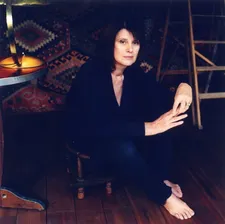 |
| Catherine Breillat: 'They took all of my books and objects…' for the set in Brussels. |
AKT: Vilko says to Maud "We could have been Bonnie and Clyde." What do you think about the fascination with them?
CB: Rocancourt was not only a professional liar. He said he was tricking the most famous stars in America. The most famous people in Los Angeles, like De Niro gave money to him, but it was not true. In fact, I think there were only two people he took money from, me and Michel Polnareff. No Americans, just French. It is so romantic to be Bonnie and Clyde. The character has no possibility to be real, only to dream.
AKT: In a scene on the street, Maud walks with her assistant to the wrong car. After five years, she doesn't recognise his car. He points out that she couldn't care less about cars. It is very telling for the character. Is that you?
CB: Yes! The same car for like 10 years, and I never recognise it. For me, I always go to the first. In my life, not only the first car. The first person also. The first chair I can reach.
AKT: That doesn't apply to your actors?
CB: No.
AKT: How did it come about to have Isabelle Huppert star in Abuse of Weakness?
CB: Several times before I wanted to work with Isabelle. She not really refused. This time I took the phone and said "Isabelle, if you want to shoot a movie with me, then do this one. You have to interpret this character because afterwards you cannot make a movie with me because perhaps I will be dying." [Catherine was smiling at me].
AKT: A bit of blackmail? She said yes. How could she refuse?
CB: Yes. She understood that I really, really desired her. The character is her and she cannot refuse. I made it impossible for her to say no. I have decided.
AKT: A very good decision. She is great in the film.
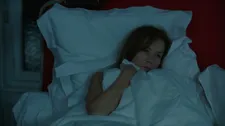 |
| Isabelle Huppert - 'The character is her and she cannot refuse.' |
AKT: Can you talk about your decision to have her look into the camera in the end? The gaze of agency?
CB: For me, in the end there are all these people who look at her, who are normal, who are in reality. She looks at them and their normalcy and there is nothing.
AKT: She realises the emptiness in them?
CB: They love her. They are nice. But what is the normalcy of life? It is absurd to be normal. If your conception of life is as boring as that, if you want a life without danger - then you are just born to die, not to live. Because living is dangerous.
Abuse of Weakness screens at London Film Festival this week.





















